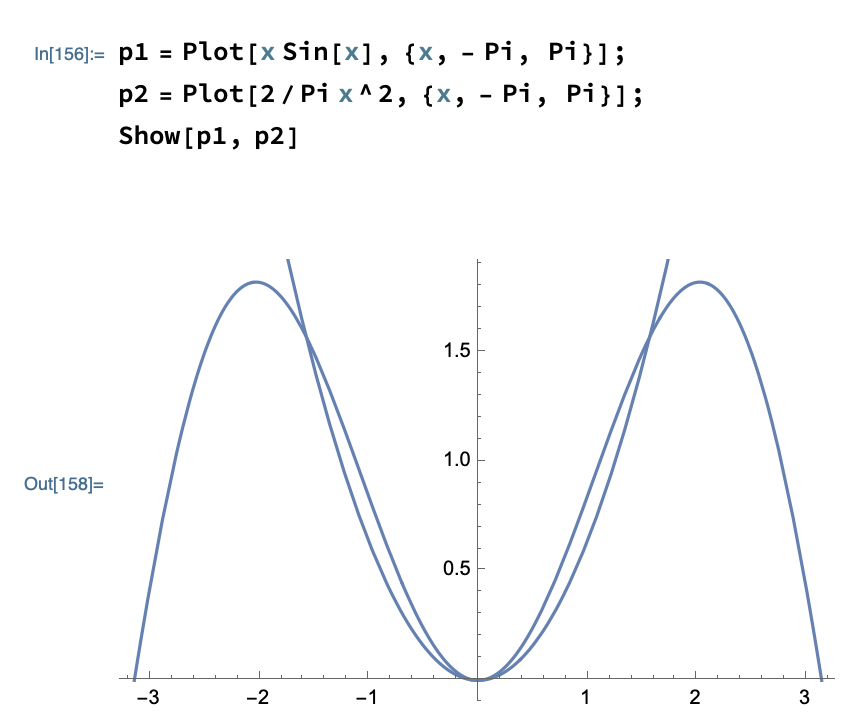Let $\theta=(\theta_1,\theta_2,\cdots \theta_n)$, and $a_{ij}$ are constants. There is no condition on the positiveness of $a_{ij}$.
Under which condition on $\theta$, such that the following function only has one type of root, which is all $\theta_i$ equals, i.e. $\theta_i-\theta_j=0$, for any $(i,j)$ pair?
\begin{equation}\label{1} \sum_{1\leq i,j\leq n} a_{ij} (\theta_i-\theta_j)\sin((\theta_i-\theta_j)t)=0,\text{ for }t\in(0,1]. \end{equation}
What I already know is the case $a_{ij}\geq 0$
If $a_{ij}$ is element in the adjacency matrix of a connected graph (thus, $a_{ij}\geq 0$), then by imposing the constriant $\theta_i-\theta_j\in[-\frac{\pi}{2},\frac{\pi}{2}]$, we have $$(\theta_i-\theta_j)t\sin((\theta_i-\theta_j)t)\geq\frac{2}{\pi}(t^2(\theta_i-\theta_j)^2),\text{ for }t\in(0,1]$$ since $x\sin x\geq \frac{2}{\pi}x^2$ for $x\in[-\frac{\pi}{2},\frac{\pi}{2}]$ (see the figure of $x\sin x$ below)
Thus $$\frac{1}{t}a_{ij} (\theta_i-\theta_j)t\sin((\theta_i-\theta_j)t)\geq a_{ij}\frac{2}{\pi}t(\theta_i-\theta_j)^2,\text{ for }t\in(0,1]$$ which allows us to conclude that $\theta_i-\theta_j=0$.
My question specifically regarding the case that $a_{ij}$ can be both positive, zero and negative.
Any idea would be much appreciated!
Update: Since writing in comments about the following is too long, I write here as answer. Thanks for @Alexandre Eremenko pushing forward. I still have no idea how to proceed the case (2) and (3), which means Sines are not linearly independent.
(1) If there is no $\sin((\theta_i-\theta_j)t)$ equals, then all $\sin((\theta_i-\theta_j)t)$ are linearly independent.
Under this condition, since $\sin((\theta_i-\theta_j)t)$ are linearly independent, then only when $a_{ij}(\theta_i-\theta_j)=0$ (equivalently $(\theta_i-\theta_j)=0$ since we consider $a_{ij}\neq 0$) it holds that $\sum a_{ij}(\theta_i-\theta_j)\sin((\theta_i-\theta_j)t)=0$.
(2) If there is $\sin((\theta_i-\theta_j)t)$ equals, equivalently, there exists pair of $\theta_i-\theta_j$ equals and there exists $i_1,j_1,i_2,j_2$ such that $(\theta_i-\theta_j)+(\theta_i-\theta_j)=\pi+2k\pi$ where $k\in\mathbb{Z}$. Then Sines are not linearly independent. We split into two cases:
(2.1) If there exists pair of $\theta_i-\theta_j$ equals, then for those $i^*,j^*$ that $\theta_{i^*}-\theta_{j^*}\neq 0$, we do not have further information and this needs further analysis.
(2.2) If there exists $i_1,j_1,i_2,j_2$ such that $(\theta_i-\theta_j)+(\theta_i-\theta_j)=\pi+2k\pi$ where $k\in\mathbb{Z}$, then we do not have further information and this needs further analysis.

